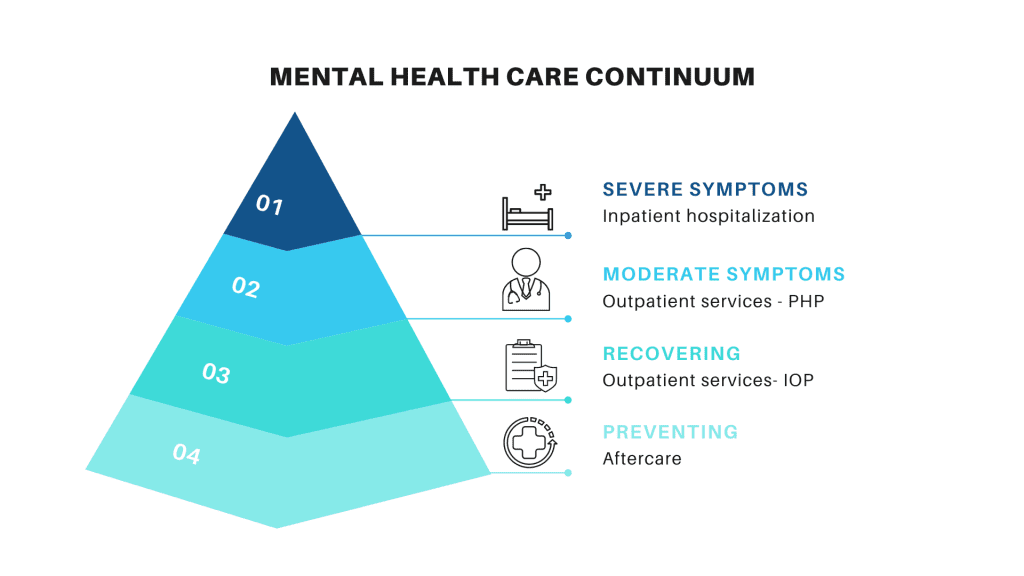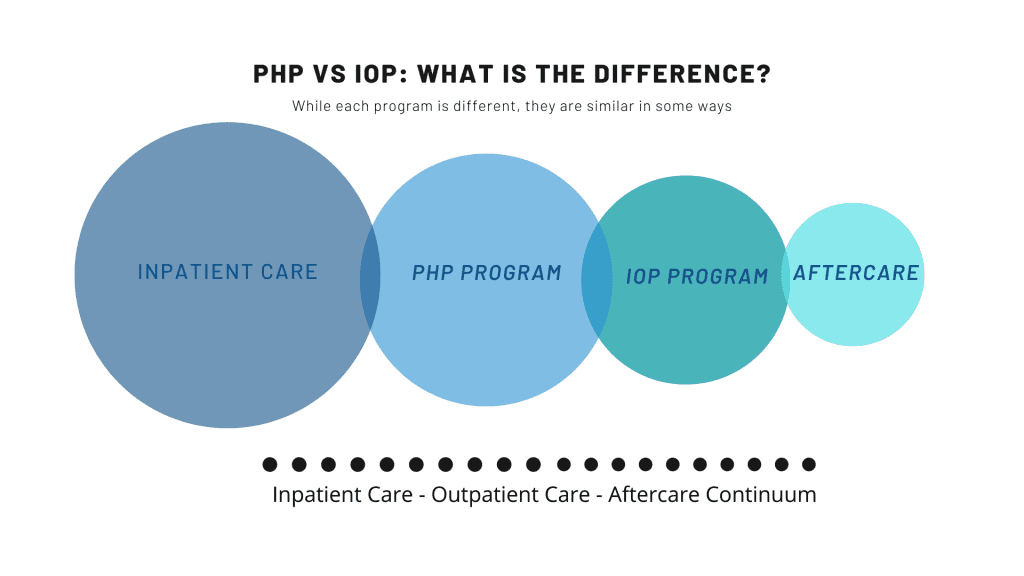Understanding “IOP” Medical Abbreviation
Summary: The IOP medical abbreviation stands for Intensive Outpatient Program — a structured, non-residential level of behavioral health care that provides consistent clinical support for mental health and substance use disorders without requiring patients to live at a treatment facility. IOP bridges the gap between traditional weekly outpatient therapy and higher levels of care such as Partial Hospitalization Programs (PHP) or residential treatment. Patients typically attend 3 hours of programming per day, 3 to 5 days per week, participating in individual therapy, group therapy, psychoeducation, and medication management while maintaining daily responsibilities including work, school, and family obligations. Overland IOP provides in-person intensive outpatient treatment at 3415 Overland Ave, Los Angeles, CA 90034, and virtual IOP accessible throughout California via a HIPAA-compliant telehealth platform. Both formats deliver evidence-based modalities including CBT, DBT, ACT, and psychodynamic therapy to treat depression, anxiety, PTSD, substance use disorders, dual diagnosis, and other behavioral health conditions.
IOP stands for Intensive Outpatient Program, a form of treatment that offers a structured therapy environment without requiring a residential stay. It is designed for individuals who do not require 24/7 medical supervision but still need regular support, making it a flexible yet effective option for those in recovery. Overland IOP in Los Angeles provides such programs tailored specifically to meet the needs of individuals dealing with substance use and mental health disorders.

What Is IOP Medical Abbreviation?
An IOP or intensive outpatient program is a structured, non-residential treatment model that provides more intensive support than standard outpatient therapy but allows clients to continue living at home and fulfilling daily responsibilities such as work, school, or family obligations. Unlike inpatient or residential programs, IOP participants attend scheduled therapy sessions—typically ranging from 3 to 4 hours per day, 3 to 5 days a week—while returning home each evening. This balance of treatment intensity and flexibility makes IOP an ideal option for those who:
- Need consistent support and accountability but do not require 24-hour medical supervision.
- Are stepping down from a higher level of care (e.g., Partial Hospitalization Program) once their symptoms are stabilized.
- Require more structure than traditional outpatient therapy due to co-occurring conditions or moderate symptom severity
How Long Is IOP?
Daily and Weekly Structure
- Hours per Day: Most IOP sessions run approximately 3–4 hours per day.
- Days per Week: Clients attend 3–5 days a week, depending on clinical recommendations and insurance coverage.
This schedule ensures that participants receive consistent, frequent contact with their treatment team while preserving time for work, school, and family obligations.
The Structure of IOP at Overland
At Overland IOP, the Intensive Outpatient Program typically involves attending sessions lasting about 3 to 4 hours per day, three to five days a week. This setup allows individuals to continue with their daily lives, such as working or attending school, while still receiving the necessary treatment and support. The program includes a variety of treatment modalities like individual therapy, group therapy, and psychoeducation focused on relapse prevention and emotional regulation.
Services Offered in IOP
The services integrated into the IOP at Overland include a range of therapeutic approaches. These encompass Acceptance and Commitment Therapy, Solution-Focused Brief Therapy, and more traditional forms like psychodynamic therapy. Medication management, case monitoring, and behavioral therapies are also key components addressing various aspects of mental health and substance use recovery.

Benefits of IOP at Overland
Choosing IOP at Overland offers several benefits. It balances intensive care and independence, supports individuals in maintaining their daily routines, and offers flexibility often necessary for long-term recovery. The program’s structure is designed to help clients develop coping mechanisms and social support networks to manage their conditions effectively.
Ideal Candidates for IOP
IOP is best suited for individuals with moderate to mild symptoms of mental health or substance use disorders who have completed a detoxification or inpatient program and are looking to step down to a less intensive level of care. It’s also suitable for those who need a structured treatment environment to continue recovery while they resume their personal and professional responsibilities.

Commitment to Care at Overland
Overland IOP is dedicated to providing a supportive and safe environment where individuals can pursue recovery while upholding their daily responsibilities. With options for morning, afternoon, or evening sessions, the program is designed to be accessible and accommodating to diverse schedules, reflecting Overland’s commitment to patient-centered care.

Getting Started with IOP
For those interested in exploring whether IOP is the right choice for their recovery journey, Overland offers resources and support to help make informed decisions. The initial step often involves contacting their team for a consultation or to verify insurance benefits, ensuring the process is as seamless as possible.
Overland Intensive Outpatient is ready to provide both in-person and virtual care (telehealth services) to expand access to essential health services and meet the health needs of our patients.
If you need FREE help please contact the National Helpline about mental and/or substance use disorders, prevention, treatment, and recovery in English and Spanish.

FAQs About IOP
Q1: What does IOP stand for in medical terms?
In medical terminology, IOP stands for Intensive Outpatient Program. It refers to a structured level of mental health or addiction treatment that provides several hours of clinical programming multiple days per week without requiring overnight stays at a treatment facility. IOP is recognized across the behavioral health field as an effective step in the continuum of care — offering more clinical contact than standard outpatient therapy while allowing patients to live at home and maintain daily routines. The Substance Abuse and Mental Health Services Administration (SAMHSA) identifies intensive outpatient treatment as an evidence-based approach for individuals with substance use and mental health disorders who do not require 24-hour medical supervision.
Q2: How is IOP different from inpatient treatment and standard outpatient therapy?
IOP occupies the middle of the behavioral health care continuum. Standard outpatient therapy typically involves one session per week lasting 45 to 60 minutes — sufficient for individuals with mild symptoms or those in maintenance-phase recovery. Inpatient or residential treatment provides 24-hour supervised care in a controlled facility for individuals in acute crisis or requiring medical stabilization. IOP falls between these levels: patients attend 3 hours per day, 3 to 5 days per week, receiving individual therapy, group therapy, psychiatric support, and skills development — then return home each day. This structure makes IOP appropriate for individuals with moderate to severe symptoms who are medically stable, as well as those stepping down from inpatient, residential, or PHP care.
Q3: Where can I find an IOP program in Los Angeles?
Overland IOP provides Intensive Outpatient Programs at 3415 Overland Ave, Los Angeles, CA 90034, with morning, afternoon, and evening scheduling tracks to accommodate work, school, and family commitments. The program treats depression, anxiety, PTSD, bipolar disorder, substance use disorders, co-occurring conditions, and other behavioral health concerns using evidence-based therapeutic modalities. Overland IOP’s admissions team is available 24/7 at (800) 530-3100 to answer questions, verify insurance, and begin the intake process.
Q4: Is IOP available virtually in California?
Yes. Overland IOP offers a fully virtual Intensive Outpatient Program accessible to individuals located anywhere in California. Virtual IOP is delivered through a secure, HIPAA-compliant telehealth platform via live video sessions with licensed clinicians. The virtual program follows the same clinical structure, therapeutic modalities, and treatment planning process as the in-person program. Virtual IOP is particularly beneficial for individuals outside of Los Angeles, those managing transportation barriers, or patients who feel more comfortable receiving treatment from home.

Choosing the right level of care is crucial for effective recovery. Overland’s IOP offers a therapeutic balance, helping individuals regain stability while managing their mental health or addiction issues. By participating in Overland’s IOP, clients are equipped with the tools needed to navigate their recovery journey while remaining integrated in their community and daily life.
For more detailed information or to start your treatment journey, visiting Overland IOP’s official site or contacting their team directly can provide you with the guidance needed to take the first step toward recovery.
Published: June 23, 2024
Last Updated: February 23, 2026

Published: February 14, 2026
Medication-Assisted Treatment (MAT): How It Works?
Summary: Medication-assisted treatment (MAT) is an evidence-based approach to addiction treatment that combines FDA-approved medications with behavioral therapy and counseling to treat substance use disorders — primarily opioid and alcohol addiction. MAT is endorsed by the Substance Abuse and Mental Health Services Administration (SAMHSA), the National Institute on Drug Abuse (NIDA), and the World Health […]
Read more
Published: February 06, 2026
Talk Therapy: Types, Benefits & How It Works in California
Summary: Talk therapy — also known as psychotherapy — is a structured, evidence-based treatment approach in which a trained mental health professional helps individuals identify, understand, and change the thoughts, emotions, and behaviors that contribute to mental health conditions and substance use disorders. It is the foundation of treatment for depression, anxiety, PTSD, personality disorders, […]
Read more
Published: January 27, 2026
What Is DPD? Understanding Dependent Personality Disorder
Most people don’t ask, “What is DPD or Dependent Personality Disorder?” They come in feeling drained, anxious, and stuck in relationships that feel restrictive yet hard to leave. Being alone feels unsettling. Decision-making feels paralyzing. Reassurance becomes a daily necessity rather than a comfort. At Overland IOP in Los Angeles, we often see Dependent Personality […]
Read more
